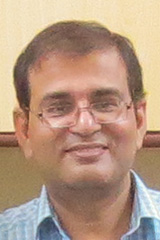Related Research Articles
Narendra Krishna Karmarkar is an Indian mathematician. Karmarkar developed Karmarkar's algorithm. He is listed as an ISI highly cited researcher.

Tata Institute of Fundamental Research (TIFR) is an Indian Research Institute under the Department of Atomic Energy of the Government of India. It is a public deemed university located at Navy Nagar, Colaba in Mumbai. It also has campus in Bangalore, International Centre for Theoretical Sciences (ICTS), and an affiliated campus in Serilingampally near Hyderabad. TIFR conducts research primarily in the natural sciences, the biological sciences and theoretical computer science.
Duration calculus (DC) is an interval logic for real-time systems. It was originally developed by Zhou Chaochen with the help of Anders P. Ravn and C. A. R. Hoare on the European ESPRIT Basic Research Action (BRA) ProCoS project on Provably Correct Systems.

Zhiming Liu is a computer scientist. He studied mathematics in Luoyang, Henan in China and obtained his first degree in 1982. He holds a master's degree in Computer Science from the Institute of Software of the Chinese Academy of Sciences (1988), and a PhD degree from the University of Warwick (1991). His PhD thesis was on Fault-Tolerant Programming by Transformations.

Rajeev Alur is an American professor of computer science at the University of Pennsylvania who has made contributions to formal methods, programming languages, and automata theory, including notably the introduction of timed automata and nested words.

OrthoCAD Network Research Cell is a federally funded research and development facility in the Indian Institute of Technology Bombay, Mumbai, India. The Laboratory's primary function is the design and development of reconstruction systems for orthopaedic and other applications, the current focus is on mega-implants for limb-saving surgery, mainly for children affected by bone cancer. The Cell later led to the establishment of Biomedical Engineering and Technology (incubation) Centre (BETiC).

Nagarjuna G. works in the Homi Bhabha Centre for Science Education, Tata Institute of Fundamental Research in Mumbai, India. His major research interests include Science Education, Cognitive Science, History and Philosophy of Science and Structure and Dynamics of Knowledge. As an activist he focuses on promoting free knowledge and free software and serves as the chairperson of Free Software Foundation of India.
Sugata Sanyal is a Professor in the School of Technology and Computer Science at Tata Institute of Fundamental Research. He is well known for his contributions in the field of Network Security and Computer Architecture.
Supratik Chakraborty is an Indian computer scientist. He is currently Bajaj Group Chair Professor in the Department of Computer Science and Engineering at Indian Institute of Technology Bombay.
Mathai Joseph is an Indian computer scientist and author.

Vijay Kumar Vaishnavi is a noted researcher and scholar in the computer information systems field with contributions mainly in the areas of design science research, software engineering, and data structures & algorithms, authoring over 150 publications including seven books in these and related areas, and co-owning a patent. He is currently Professor Emeritus at the Department of Computer Information Systems, Georgia State University. He is Senior Editor Emeritus of MIS Quarterly and is on the editorial boards of a number of other major journals. His research has been funded by the National Science Foundation (NSF) as well as by the industry.
Rangaswamy Narasimhan was an Indian computer and cognitive scientist, regarded by many as the father of computer science research in India. He led the team which developed the TIFRAC, the first Indian indigenous computer and was instrumental in the establishment of CMC Limited in 1975, a Government of India company, later bought by Tata Consultancy Services. He was a recipient of the fourth highest Indian civilian award of Padma Shri from the Government of India in 1977.
Paranandi Venkata Suryanarayana Rao is an Indian computer scientist, known for his research in the fields of speech and script recognition and is credited with contributions to the development of TIFRAC, the first indigenously developed electronic computer in India. He is a recipient of awards such as IEEE Third Millenium Medal, Vikram Sarabhai Award, Om Prakash Bhasin Award and VASVIK Industrial Research Award. The Government of India awarded him the fourth highest civilian honour of Padma Shri in 1987.
Mangalore Anantha Pai was an Indian electrical engineer, academic and a Professor Emeritus at the University of Illinois at Urbana–Champaign. A former professor of electrical engineering at the Indian Institute of Technology, Kanpur, he is known for his contributions in the fields of power stability, power grids, large scale power system analysis, system security and optimal control of nuclear reactors and he has published 8 books and several articles. Pai is the first India born scientist to be awarded a PhD in Electrical Engineering from the University of California, Berkeley.
Vivek Shripad Borkar is an Indian electrical engineer, mathematician and an Institute chair professor at the Indian Institute of Technology, Mumbai. He is known for introducing analytical paradigm in stochastic optimal control processes and is an elected fellow of all the three major Indian science academies viz. the Indian Academy of Sciences, Indian National Science Academy and the National Academy of Sciences, India. He also holds elected fellowships of The World Academy of Sciences, Institute of Electrical and Electronics Engineers, Indian National Academy of Engineering and the American Mathematical Society. The Council of Scientific and Industrial Research, the apex agency of the Government of India for scientific research, awarded him the Shanti Swarup Bhatnagar Prize for Science and Technology, one of the highest Indian science awards for his contributions to Engineering Sciences in 1992. He received the TWAS Prize of the World Academy of Sciences in 2009.

Subhasis Chaudhuri is an Indian electrical engineer and the director at the Indian Institute of Technology, Bombay. He is a former K. N. Bajaj Chair Professor of the Department of Electrical Engineering of IIT Bombay. He is known for his pioneering studies on computer vision and is an elected fellow of all the three major Indian science academies viz. the National Academy of Sciences, India, Indian Academy of Sciences, and Indian National Science Academy. He is also a fellow of Institute of Electrical and Electronics Engineers, and the Indian National Academy of Engineering. The Council of Scientific and Industrial Research, the apex agency of the Government of India for scientific research, awarded him the Shanti Swarup Bhatnagar Prize for Science and Technology, one of the highest Indian science awards, in 2004 for his contributions to Engineering Sciences.
Abhay Karandikar is an Indian educator, engineer and advisor, and philosopher best known for his work in telecommunication sector in India.Currently, he is serving as the Secretary of the Department of Science and Technology,Government of India from October 2023 onwards.Previously, he served as the Director of Indian Institute of Technology, Kanpur from April 2018 to September 2023.Prior to that, Karandikar has held a number of positions including Dean and Institute chair professor in the Department of Electrical Engineering at the Indian Institute of Technology, Bombay; Centre for Development of Advanced Computing and TSDSI. He was one of the founding members of Telecom Standards Development Society of India and appointed as its first Vice Chairman from 2014 to 2016, and then was appointed its Chairman from 2016 to 2018. He was chairman of the committee to give recommendations to Government of India on size, scope and quantum of spectrum for experimental spectrum license for 5G.

Hussein S. M. Zedan was a computer scientist of Egyptian descent, mainly based in the United Kingdom.
Avik Bhattacharya is a professor at the Centre of Studies in Resources Engineering, Indian Institute of Technology Bombay, Mumbai, India. He has been working in the field of radar polarimetry theory and applications for more than a decade. His main focuses on the use of synthetic aperture radar (SAR) data for land use classification, change detection and qualitative and quantitative biophysical and geophysical information estimation.

Srinivasan Ramakrishnan is a condensed matter physicist working on experimental ultra-low temperature research. He was the director and distinguished professor of the Tata Institute of Fundamental Research (TIFR). Recently, he joined IISER Pune as a distinguished professor.
References
- 1 2 Pandya, Paritosh (1997–2001). "DCVALID: A tool for modelchecking Duration Calculus Formulae". India: Tata Institute of Fundamental Research . Retrieved 29 January 2014.
- 1 2 "TCRTS Awards – 2020 Test-of-Time Awards". RTAS 2021: 27th IEEE Real-Time and Embedded Technology and Applications Symposium. May 2021. Retrieved 22 May 2021.
- ↑ "Paritosh K. Pandya : Home Page". www.cse.iitb.ac.in. Retrieved 18 September 2022.
- 1 2 "Curriculum Vitae: Paritosh K. Pandya". India: Tata Institute of Fundamental Research . Retrieved 29 January 2014.
- ↑ "Finding response times in a real-time system". Google Scholar . Retrieved 24 May 2021.
- ↑ Joseph, Mathai; Pandya, Paritosh (1986). "Finding Response Times in a Real-Time System". The Computer Journal . 29 (5): 390–395. doi: 10.1093/comjnl/29.5.390 .
- ↑ "Editorial Board". Formal Aspects of Computing . Springer . Retrieved 29 January 2014.